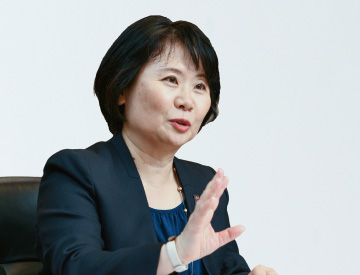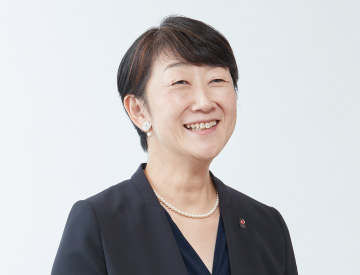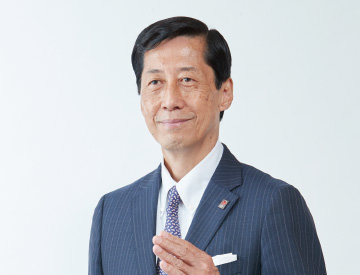
SOMPO’s Purpose Management
Three-Way Discussion With Directors
Culture Change for Sustainable Growth
Transforming into a Culture of Challenge and Innovation Based on My Purpose

Isao Endo
Independent Director
Meyumi Yamada
Independent Director
Ryoko Shimokawa
Group Chief Sustainability Officer (CSuO)
My Purpose-driven culture change
Shimokawa Seeking to break away from the “me in the company” work-style paradigm that has traditionally been dominant in Japan, Sompo Group has been pursuing Purpose Management based on “My Purpose,” which refers to one’s own purpose of life or meaning of work. The idea is to foster a culture driven by My Purpose and make it the driving force for sustainable growth and increased corporate value enhancement. I believe that the essence of Purpose Management is to create value unique to SOMPO, that is, to provide happiness to people and pursue sustainable growth by solving social issues.
We have deployed a variety of measures over the past three years, but since culture change is not something that can be achieved overnight, we purposefully try to do so in a connected and linked manner, rather than having the measures culminate in some single event. For example, in response to the theme and content of the town hall meetings, which are carried out as a means of communication by top management, we have implemented on-site measures such as My Purpose training, and training for the management level in conjunction with these town halls, and have measured their effectiveness and progress through engagement surveys and other means. Starting in fiscal 2022, we established the SOMPO Awards, a Group-wide award system, not only to encourage employees to take on challenges driven by My Purpose, but also to praise and support those who have taken on such challenges, and to try to transform the culture into one of challenge and innovation.
Another thing we are working on is building “impact paths.” The goal is to improve our ability to tell our story by visualizing the mechanism by which various initiatives based on the pursuit of My Purpose lead to increased willingness to take on challenges, and then presenting evidence of this through data analysis and other means.
In this way, we are proceeding through trial and error. First, however, I’d like to ask Mr. Endo and Ms. Yamada what they think about the Group’s approach and thinking.
Endo I believe we have reached a point in time when many Japanese companies are in need of a paradigm shift that will fundamentally change the relationship between the company and the individual, and Sompo Group has been recognized for its forward-thinking efforts in this regard. However, such a paradigm shift requires a truly fundamental change in mindset, both for the company and the individual. This is not something that can be easily changed after a few years of work. I recognize that things will change gradually over the course of five to ten years, by all possible means. As a start, we are taking on many challenges and seeing tangible changes. This is a long-term effort, so it is important to keep sending out the message and stick with it. I fully agree with this direction, and I think Japanese companies will not be able to survive without such efforts.
Yamada I too believe that a paradigm shift is the most important concept right now. Not only will the relationship between the company and the individual change, but we are now experiencing so many global natural disasters that we’ve entered a world where “abnormalities” are an everyday occurrence. I don’t think there is anyone who does not experience social issues such as global warming and geopolitical risks on a daily basis as a global citizen. The younger generation, in particular, feels a sense of crisis as a personal matter, and when we think about the future society of our children, there are a lot of problems that adults have the responsibility to address. Under such circumstances, I think that the basic premise of the company must be to contribute to society through the pursuit of economic value, or else young people, in particular, will not find their work fulfilling.
Therefore, I think Purpose Management is a very reasonable approach. I recently had the opportunity to participate in voting for the SOMPO Awards. I was impressed by how this initiative is happening from the bottom up; people are thinking seriously about social issues and tackling them while getting others around them involved.
Shimokawa Thank you very much. In order for us to remain needed by society 100 years from now, we ourselves must grow and change. To do so, we must fundamentally shift our paradigm. With this in mind, we are undertaking this major reform. When it comes to social issues, we agree that, both as a company and as individuals, we can grow by tackling larger social issues.
Changes as a result of our initiatives
Shimokawa Next, I would like to talk about the changes we have seen in our employees as a result of the various initiatives over the past three years. In my opinion, there are three main types of changes.
The first is personal change. I think of the My Purpose initiative as an activity that awakens employee I&D (Inclusion & Diversity). I feel that slowly but surely more and more employees are becoming aware of what they want to do, the significance of their work, and their goals through the process of formulating them. I also feel that through activities to share My Purpose in the workplace, people are starting to become aware of the individuality of their colleagues around them.
The second change is in the management level. Managing employees who have awakened to their individuality has never been more difficult. Having My Purpose is not the goal; the original aim of My Purpose is to inspire people to take on challenges. A survey of managers showed that only about 45% of all respondents have reached that point. As for the concerns of the managers, they seem to be experiencing difficulties in terms of how to interact with and manage employees on the theme of My Purpose, how to connect My Purpose with SOMPO’s Purpose and one’s mission or work in the workplace, and how to unite their teams.
The third type of change is what we have seen from the SOMPO Awards. We received 993 applications from all over the world, and approximately 7,500 employee votes were cast to evaluate the entries. This level of response was unexpected, but in a good way. It made me feel that many employees are interested in the challenges their colleagues are tackling and want to cheer them on. In addition, based on the initiatives submitted, I realized that many employees are thinking about solutions to new social issues and how they want to implement them, and are actually translating that into action.
On the other hand, it is true that there are still many employees who are not willing to take on challenges, or who are willing to take on challenges but are not ready to take action, and it makes me feel that we still have a long way to go. Do you have any advice regarding these changes and future challenges?
Yamada I watched the video of the SOMPO Awards and was first of all very surprised at the amount of energy the employees had. On the other hand, depending on their type of job or duties, some may find it difficult to connect their work with My Purpose and the social issues they want to solve. I think this award has provided a lot of inspiration to all of our employees. From this starting point, I hope you will make the award more valuable and continue to improve it so that more and more people will identify personally with it.
Endo In general, there is a 2-6-2 rule in organizations, with about 20% of the workforce being highly motivated and aware of the issues. I think what we are seeing now is the stirrings of this 20% of people. The issue is the other 80% of the workforce. In reality, there are many employees who are unable to ride a wave of change like this. Culture change, which is the ultimate goal, is about the people on the operational frontlines becoming self-reliant and self-driven, free from the prodding of management. Therefore, we must find, educate, and motivate core personnel who can lead these activities on the operational frontlines and exert centrifugal force. Once people who demonstrate this kind of initiative become the majority, the atmosphere will change dramatically. Looking at the survey figure Ms. Shimokawa cited earlier, we have not reached 50% yet, so I think this is where the next challenge lies.
Right now, it’s a personal challenge, but I think the ultimate goal is how to spread a workplace atmosphere where it is natural to take on challenges. Going forward, we need to establish good examples at the level of the individual workplace.

Shimokawa After all, managers are the key. The activities to-date have created a spark in the top 20%, which has gradually ignited a fire in the management level and is beginning to have a positive impact on some organizational units. From the point of view of making this the majority, we have no choice but to work in a steadfast manner.
Endo In addition to working in a steadfast manner, the attitudes and conduct of managers such as department heads and section chiefs are of course very important. Even if we create a spark in one awakened individual, their motivation will falter unless they get empathy from others and understanding from their superiors. It’s a mistake to say, “I’m busy with the work at hand, so culture change will have to wait.” In order to achieve results in our work, we must first create a good culture and demonstrate individual initiative. How many managers understand this? When I look at various companies, the managers are too busy to really work on it. Creating a good culture in each workplace unit is an important point and a major challenge.
What is “innovation capacity”?
Shimokawa I understand the importance of establishing culture at the level of the individual workplace. In addition to this, to increase corporate value, I believe we must bring about innovation in a broad sense, in both new areas and existing businesses. What is innovation capacity? In other words, what capabilities should a company and its employees develop to increase their innovation capacity?
Yamada Perhaps the most important thing is the ability to set goals. I think it’s important to adopt the perspective of, “how can we approach social issues to make things a little better?” It doesn’t have to be a technical discovery; it could be just a rethinking or redesign of existing businesses and operations.
Plus, a strong will. I believe that a high-energy organization with a strong will is the minimum requirement to generate innovation.
Endo We tend to think of innovation as a brilliant individual coming up with ideas and concepts that no one else has thought of. Of course, in addition to such Western-style deductive innovation by an individual, there is also Japanese-style inductive innovation.
An example is “kaizen,” the Japanese philosophy of continuous improvement. First, we apply kaizen to improve our own workplaces and services. Then, as an extension of this process, ideas are inductively generated from the field, such as providing customers with services that will make them happier and contribute more to society. It can start with a small challenge, a small change. It happens as a matter of course. I believe this is what it means to be an organization capable of innovation. To that end, it is important to develop human resources who can use their ingenuity to creatively solve problems on-site.
Once “kaizen” becomes a culture, it gains strength. Everyone starts looking for kaizen ideas without being told to do so. Major innovations can emerge from this.
As Ms. Yamada said, kaizen requires setting goals first, and then increasing the number of individuals and teams who can do it themselves. I believe that culture change is about introducing good examples and creating a positive atmosphere that encourages people to adapt to the desired culture.

Yamada Many startups start with nothing but ambition and struggle to accomplish something. Precisely because they are clear about what they want to accomplish, they are able to draw on their connections and contacts, their own solutions, or the support of others, and go from “zero to one.” That’s why they keep thinking a lot about how to do that. Despite making a large number of mistakes through trial and error, they manage to move forward one step at a time. Each person, in their respective positions, actively does better work, or in other words, accumulates a series of kaizen improvements one at a time. I think this is the only way to achieve the goal.
Endo I call it “Changing small and basic things” because someone who cannot even change where their own feet are planted cannot possibly create something great. Changing small and basic things also requires a spirit of challenge and frontier spirit. The management team needs to be more aware of this, but of course the bigger the organization, the more weight and distance there is. It takes tremendous courage for frontline employees to try to change something. Therefore, the person with the initiative who can demonstrate that courage will first change his or her small and basic things. When such things are done autonomously on the operational frontlines, it means a good atmosphere has been created. I believe that this is exactly what culture is all about, and how to spread such an atmosphere is very important for the future. Once someone’s fire has been lit, they need to be led well to keep the flame from dying.
Yamada Japanese organizations are expected to be cooperative, and tend to fall into a kind of codependent relationship. But if you have a group of self-reliant individuals, they will be much more engaged with the company as a result. I think it all comes down to how the company can create an environment where people can work with independence and where mistakes are tolerated.
Shimokawa It is important to increase the number of employees with a sense of ownership and initiative, and to support them in a work environment that does not hinder them. If you do this, the value generated by each employee increases, and the value of the company as a whole increases.
Expectations for the future
Shimokawa Lastly, what do we need to do in order for our stakeholders to have high expectations of us as a company that can achieve improvements in corporate value through culture change?
Yamada In the case of SOMPO, since the areas we are involved in are directly linked to social issues, I think consumers have higher expectations for us. We live in an age when the culture on which a company is based is transparent to consumers. To be chosen by consumers and, by extension, society, we need to focus on activities that resonate with them.
I think that when you are inside a company, you tend to focus on short-term results and trends within the industry. As an independent director, I believe it’s my role to speak out from a third-party perspective, and give as broad a perspective as possible, such as what kind of value contribution our company has the potential to make to society, while being aware of the viewpoints of a wide range of stakeholders.

Endo Recently in Japan, talented people are leaving major companies and flocking to start-ups. The biggest contributing factor to this phenomenon is culture. Naturally, unless an organization has a good culture, it will not retain or attract good people. Management needs to be keenly aware that we are in such a culture-first era, and we must continue to be a company capable of accumulating top talent. And, ultimately, it must be linked to corporate value. It is important to be keenly aware that we are no longer being selected simply because we are large or well-known.
Another point is we need to think about how to value employees who make these kinds of efforts to accomplish very good things. A person who has taken on a challenge must be highly valued, and a person who has not taken on a challenge must not be. Otherwise, it will not take root as a culture. I believe that creating an environment where people who take on new challenges and show initiative are highly valued will lead to true culture change.
Shimokawa As you say, our measures to increase the speed of change and help culture change take root, such as by incorporating it into the employee assessment system, are not yet sufficient, so we need to keep this in mind and work towards those goals.
Culture change is a major premise for increasing the effectiveness of the various human resources investments the Group is making, and from the perspective of investors, consumers, and society, culture change is a leading indicator for improving corporate value. To gain the trust of society, we will continue to take on the challenge of achieving My Purpose and SOMPO’s Purpose, even though we know it is not easy to change the culture of a corporate group with more than 70,000 employees. Nonetheless, we will work together every day as a Group to make progress, even if it is just one step forward. We will continue to take the necessary steps to ensure that everyone can feel the change.














